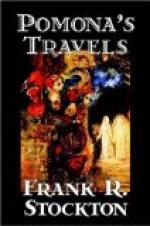To see the River Wye you must go down it, so with just one handbag we took the train for the little town of Ross, which is near the beginning of the navigable part of the river—I might almost say the wadeable part, for I imagine the deepest soundings about Ross are not more than half a yard. We stayed all night at a hotel overlooking the valley of the little river, and as the best way to see this wonderful stream is to go down it in a rowboat, as soon as we reached Ross we engaged a boat and a man for the next morning to take us to Monmouth, which would be about a day’s row, and give us the best part of the river. But I must say that when we looked out over the valley the prospect was not very encouraging, for it seemed to me that if the sun came out hot it would dry up that river, and Jone might not be willing to wait until the next heavy rain.
While we was at Chedcombe I read the “Maid of Sker,” because its scenes are laid in the Bristol Channel, about the coast near where we was, and over in Wales. And when the next morning we went down to the boat which we was going to take our day’s trip in, and I saw the man who was to row us, David Llewellyn popped straight into my mind.
This man was elderly, with gray hair, and a beard under his chin, with a general air of water and fish. He was good-natured and sociable from the very beginning. It seemed a shame that an old man should row two people so much younger than he was, but after I had looked at him pulling at his oars for a little while, I saw that there was no need of pitying him.
It was a good day, with only one or two drizzles in the morning, and we had not gone far before I found that the Wye was more of a river than I thought it was, though never any bigger than a creek. It was just about warm enough for a boat trip, though the old man told us there had been a “rime” that morning, which made me think of the “Ancient Mariner.” The more the boatman talked and made queer jokes, the more I wanted to ask him his name; and I hoped he would say David Llewellyn, or at least David, and as a sort of feeler I asked him if he had ever seen a coracle. “A corkle?” said he. “Oh, yes, ma’am, I’ve seen many a one and rowed in them.”
I couldn’t wait any longer, and so I asked him his name. He stopped rowing and leaned on his oars and let the boat drift. “Now,” said he, “if you’ve got a piece of paper and a pencil I wish you would listen careful and put down my name, and if you ever know of any other people in your country coming to the River Wye, I wish you would tell them my name, and say I am a boatman, and can take them down the river better than anybody else that’s on it. My name is Samivel Jones. Be sure you’ve got that right, please—Samivel Jones. I was born on this river, and I rowed on it with my father when I was a boy, and I have rowed on it ever since, and now I am sixty-five years old. Do you want to know why this river is called the Wye? I will tell you. Wye means crooked, so this river is called the Wye because it is crooked. Wye, the crooked river.”




